Unit 9 Have you ever been to a museum Section A (1a–2d)课件(共22张PPT,内嵌音频)
文档属性
| 名称 | Unit 9 Have you ever been to a museum Section A (1a–2d)课件(共22张PPT,内嵌音频) | 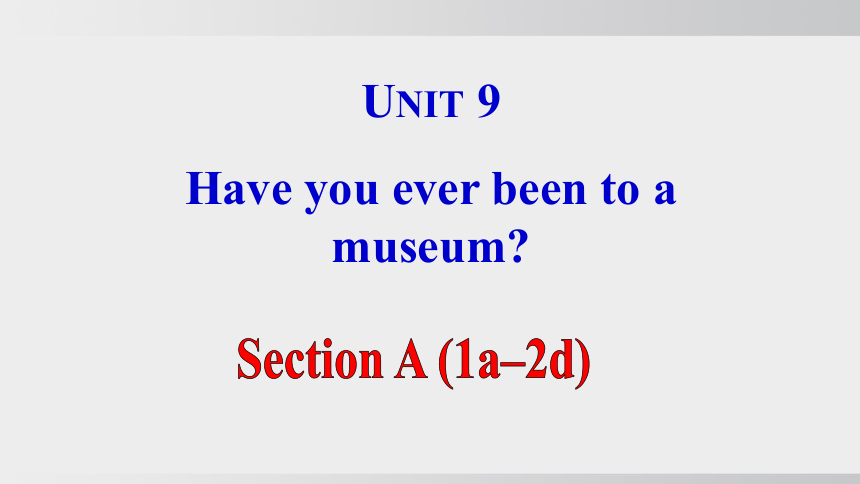 | |
| 格式 | pptx | ||
| 文件大小 | 5.1MB | ||
| 资源类型 | 教案 | ||
| 版本资源 | 人教新目标(Go for it)版 | ||
| 科目 | 英语 | ||
| 更新时间 | 2025-02-07 09:29:35 | ||
图片预览

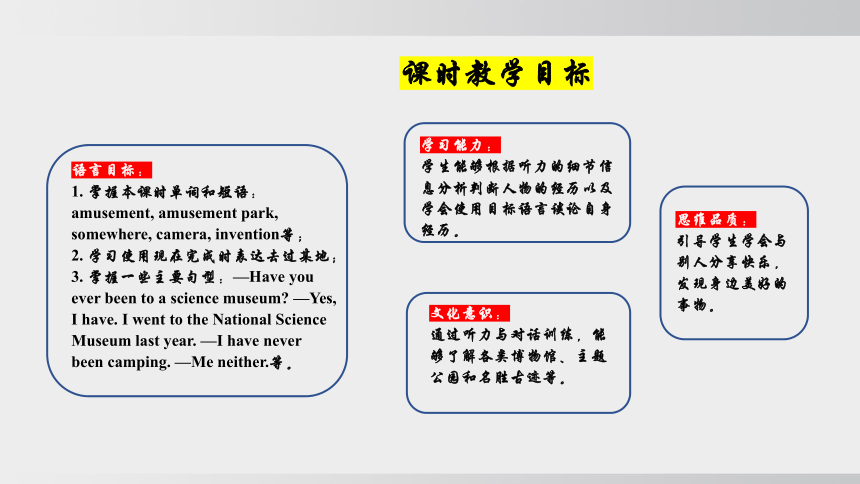
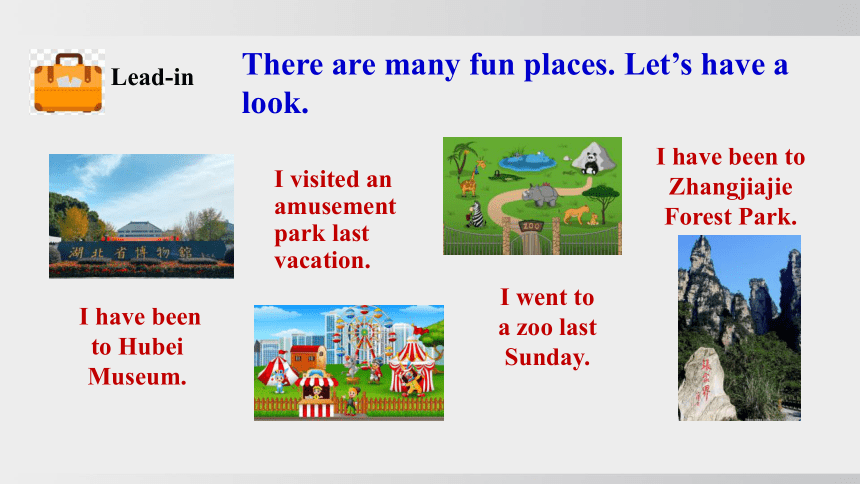
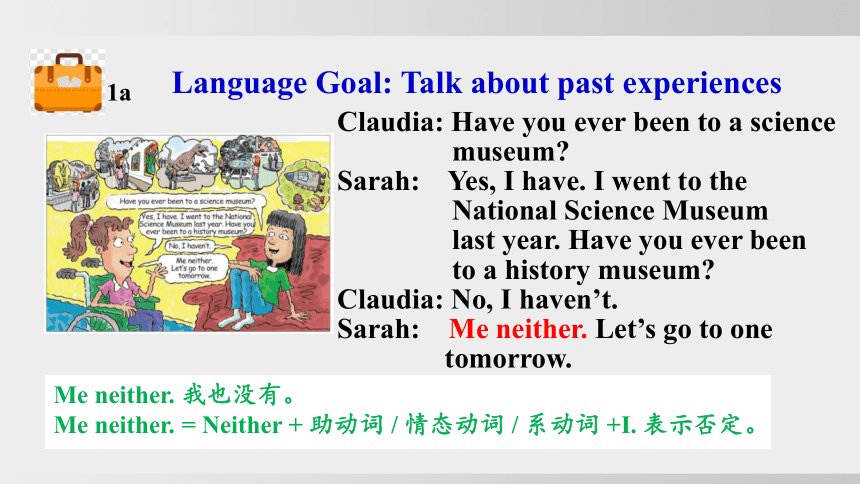
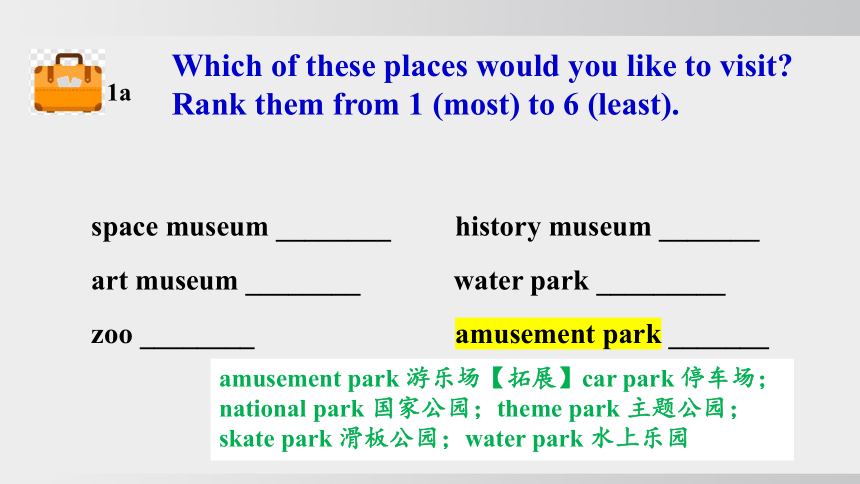
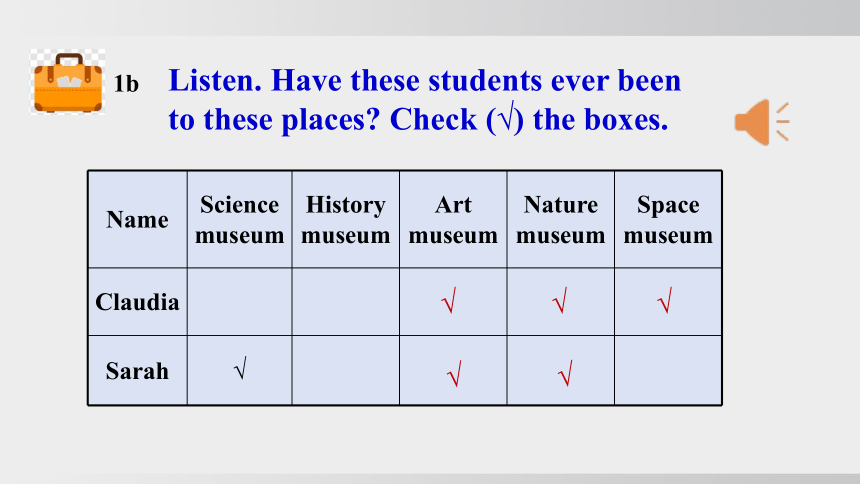
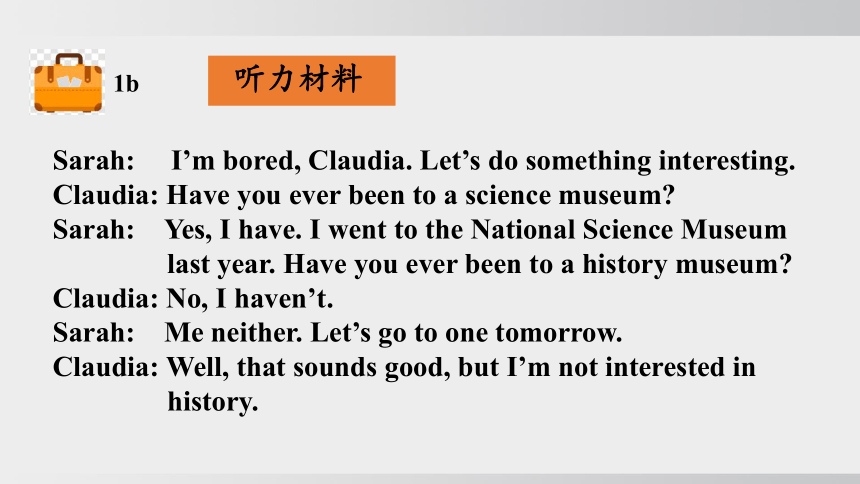
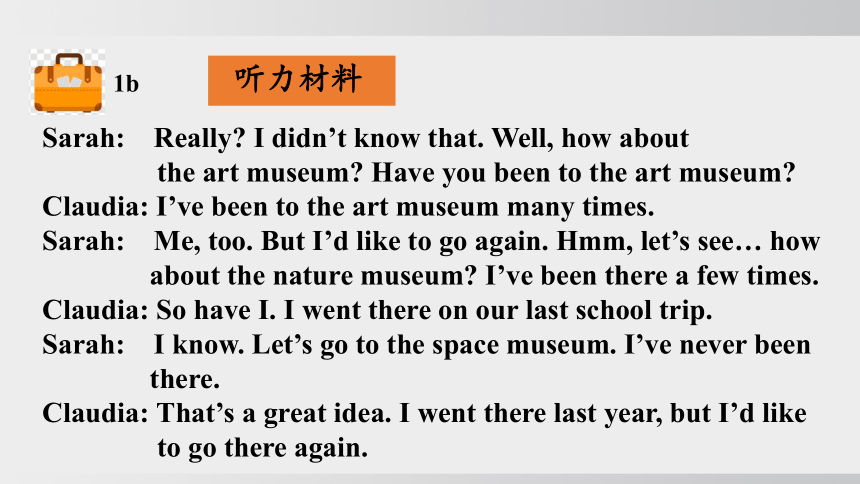
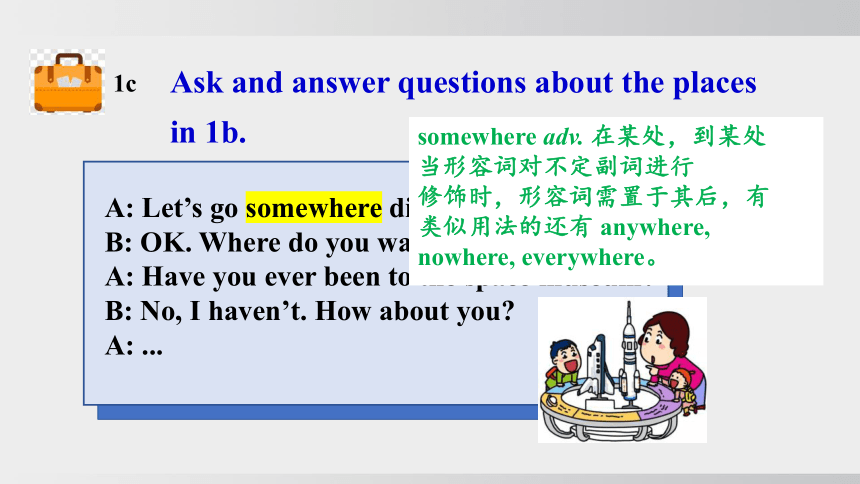
文档简介
(共22张PPT)
Section A (1a–2d)
Unit 9
Have you ever been to a museum
课时教学目标
语言目标:
1. 掌握本课时单词和短语:amusement, amusement park, somewhere, camera, invention等;
2. 学习使用现在完成时表达去过某地;
3. 掌握一些主要句型:—Have you ever been to a science museum —Yes, I have. I went to the National Science Museum last year. —I have never been camping. —Me neither.等。
文化意识:
通过听力与对话训练,能够了解各类博物馆、主题公园和名胜古迹等。
学习能力:
学生能够根据听力的细节信息分析判断人物的经历以及 学会使用目标语言谈论自身经历。
思维品质:
引导学生学会与别人分享快乐,发现身边美好的事物。
Lead-in
There are many fun places. Let’s have a
look.
I have been
to Hubei Museum.
I visited an amusement
park last vacation.
I went to a zoo last Sunday.
I have been to Zhangjiajie Forest Park.
1a
Language Goal: Talk about past experiences
Me neither. 我也没有。
Me neither. = Neither + 助动词 / 情态动词 / 系动词 +I. 表示否定。
Claudia: Have you ever been to a science
museum
Sarah: Yes, I have. I went to the
National Science Museum
last year. Have you ever been
to a history museum
Claudia: No, I haven’t.
Sarah: Me neither. Let’s go to one
tomorrow.
1a
Which of these places would you like to visit Rank them from 1 (most) to 6 (least).
space museum ________ history museum _______
art museum ________ water park _________
zoo ________ amusement park _______
amusement park 游乐场【拓展】car park 停车场;
national park 国家公园;theme park 主题公园;
skate park 滑板公园;water park 水上乐园
Listen. Have these students ever been
to these places Check (√) the boxes.
1b
Name Science museum History museum Art museum Nature museum Space museum
Claudia
Sarah √
√
√
√
√
√
1b
Sarah: I’m bored, Claudia. Let’s do something interesting.
Claudia: Have you ever been to a science museum
Sarah: Yes, I have. I went to the National Science Museum
last year. Have you ever been to a history museum
Claudia: No, I haven’t.
Sarah: Me neither. Let’s go to one tomorrow.
Claudia: Well, that sounds good, but I’m not interested in
history.
听力材料
Sarah: Really I didn’t know that. Well, how about
the art museum Have you been to the art museum
Claudia: I’ve been to the art museum many times.
Sarah: Me, too. But I’d like to go again. Hmm, let’s see… how
about the nature museum I’ve been there a few times.
Claudia: So have I. I went there on our last school trip.
Sarah: I know. Let’s go to the space museum. I’ve never been
there.
Claudia: That’s a great idea. I went there last year, but I’d like
to go there again.
1b
听力材料
1c
Ask and answer questions about the places
in 1b.
A: Let’s go somewhere different today.
B: OK. Where do you want to go
A: Have you ever been to the space museum
B: No, I haven’t. How about you
A: ...
somewhere adv. 在某处,到某处
当形容词对不定副词进行
修饰时,形容词需置于其后,有
类似用法的还有 anywhere,
nowhere, everywhere。
Pair Work
1c
A: Let’s go somewhere interesting today.
B: OK. Where do you want to go
A: Have you ever been to the art museum
B: No, I haven’t. How about you
A: I have been there only once.
A: Let’s go somewhere exciting today.
B: OK. Where do you want to go
A: Have you ever been to a history museum
B: No, I haven’t. How about you
A: Me neither.
Look at the map of the town.
Listen and circle the places you hear.
2a
Listen again and circle T for true
or F for false.
Conversation 1
1. Tina went to the space museum last year. T F
2. John has never been to the space museum. T F
3. They are going to take the subway. T F
2b
take the subway/by subway 乘地铁
Conversation 2
1. Linda has been to the amusement park. T F
2. Linda went to the amusement park yesterday. T F
3. Linda is going to the amusement park again by bike. T F
2b
Conversation 3
1. Frank had a great time at the water park. T F
2. Frank’s friend has never been to the water park. T F
3. Frank and his friend are going skating. T F
2b
go skating 去滑冰【拓展】go+v.-ing 的短语:
go fishing 去钓鱼;go swimming 去游泳;
go boating 去划船;go skiing 去滑雪
Conversation 1
John: Hey, have you ever visited the space museum, Tina
Tina: Yes, I went there last year. Have you ever been there,
John
John: No, I haven’t.
Tina: Well, I’d really like to go there again.
John: Great. What bus do we take to get to the museum
Tina: We can take the subway. The station is near the
museum.
2a–2b
听力材料
Conversation 2
Kim: Hi, Linda. Have you ever been to the amusement park
Linda: Yes, I have, but a long time ago. I remember it was
really fun. There were so many exciting things to do
there.
Kim: Do you want to go again next week
Linda: Sure. I think that would be a great idea.
Kim: Do you think we can ride our bikes there
Linda: Of course! It’s not very far away. It’s just on Green
Street, behind the zoo.
2a–2b
Conversation 3
Tom: Have you ever been to the water park, Frank
Frank: No, I’ve never been there.
Tom: Neither have I. Let’s go there together!
Frank: I’d really love to go, but I don’t have any money.
Tom: Well, let’s go skating instead. There’s a great new place
for skating in River Park on Center Street.
Frank: That’s a great idea. Could I borrow your bike I want
to go home to get my skates.
2a–2b
2c
Look at the map in 2a and make
conversations about the places.
A: Have you ever been to the space museum
B: Yes, I have. How about you
A: No, I haven’t.
B: Oh, it’s fantastic. Let’s go tomorrow.
A: OK. How are we going to get there
B: We can take the subway.
Pair Work
2c
A: Have you ever been to an
amusement park
B: No, I haven’t. How about you
A: Yes, I have. It’s really interesting.
Let’s go this weekend.
B: OK. How are we going to get
there
A: We can ride our bikes there.
2d
Role-play the conversation.
Anna: I went to the film museum last weekend.
Have you ever been there
Jill: Yes, I have. I went there back in April.
Anna: It’s really interesting, isn’t it It’s a great
way to spend a Saturday afternoon.
Jill: Yes, I love all the old movie cameras
there. I learned about the inventions
that led to color movies, too.
反意疑问句遵循“前肯定后否定,前否定
后肯定”的原则。
a great way to
do sth. 做某事的
一个好方式
invention n. 发明;创造
【拓展】invent v. 发明;创造
invent+-ion=invention
了解
导致,造成(后果)
2d
Anna: So, what did you do on the weekend
Jill: I camped in the mountains with some
friends. We put up a tent and cooked
outside.
Anna: That sounds fun. I’ve never been camping.
Jill: You should try it!
“2d”针对练习
根据汉语提示补全句子。
1. 他在聚会上玩得很开心,不是吗?
He had a good time at the party, __________
2. 计算机的发明标志着一个新时代的开始。
The __________ of the computer marked the beginning of a new era.
3. 听是学好英语的一个好方法。
Listening is _______________ learn English well.
4. 过度工作经常导致疾病。
Too much work often ___________ illness.
5. 我了解了一些关于电影的信息。
I _______________ some information about the movie.
a good way to
invention
learned about
2d
didn’t he
leads to
Section A (1a–2d)
Unit 9
Have you ever been to a museum
课时教学目标
语言目标:
1. 掌握本课时单词和短语:amusement, amusement park, somewhere, camera, invention等;
2. 学习使用现在完成时表达去过某地;
3. 掌握一些主要句型:—Have you ever been to a science museum —Yes, I have. I went to the National Science Museum last year. —I have never been camping. —Me neither.等。
文化意识:
通过听力与对话训练,能够了解各类博物馆、主题公园和名胜古迹等。
学习能力:
学生能够根据听力的细节信息分析判断人物的经历以及 学会使用目标语言谈论自身经历。
思维品质:
引导学生学会与别人分享快乐,发现身边美好的事物。
Lead-in
There are many fun places. Let’s have a
look.
I have been
to Hubei Museum.
I visited an amusement
park last vacation.
I went to a zoo last Sunday.
I have been to Zhangjiajie Forest Park.
1a
Language Goal: Talk about past experiences
Me neither. 我也没有。
Me neither. = Neither + 助动词 / 情态动词 / 系动词 +I. 表示否定。
Claudia: Have you ever been to a science
museum
Sarah: Yes, I have. I went to the
National Science Museum
last year. Have you ever been
to a history museum
Claudia: No, I haven’t.
Sarah: Me neither. Let’s go to one
tomorrow.
1a
Which of these places would you like to visit Rank them from 1 (most) to 6 (least).
space museum ________ history museum _______
art museum ________ water park _________
zoo ________ amusement park _______
amusement park 游乐场【拓展】car park 停车场;
national park 国家公园;theme park 主题公园;
skate park 滑板公园;water park 水上乐园
Listen. Have these students ever been
to these places Check (√) the boxes.
1b
Name Science museum History museum Art museum Nature museum Space museum
Claudia
Sarah √
√
√
√
√
√
1b
Sarah: I’m bored, Claudia. Let’s do something interesting.
Claudia: Have you ever been to a science museum
Sarah: Yes, I have. I went to the National Science Museum
last year. Have you ever been to a history museum
Claudia: No, I haven’t.
Sarah: Me neither. Let’s go to one tomorrow.
Claudia: Well, that sounds good, but I’m not interested in
history.
听力材料
Sarah: Really I didn’t know that. Well, how about
the art museum Have you been to the art museum
Claudia: I’ve been to the art museum many times.
Sarah: Me, too. But I’d like to go again. Hmm, let’s see… how
about the nature museum I’ve been there a few times.
Claudia: So have I. I went there on our last school trip.
Sarah: I know. Let’s go to the space museum. I’ve never been
there.
Claudia: That’s a great idea. I went there last year, but I’d like
to go there again.
1b
听力材料
1c
Ask and answer questions about the places
in 1b.
A: Let’s go somewhere different today.
B: OK. Where do you want to go
A: Have you ever been to the space museum
B: No, I haven’t. How about you
A: ...
somewhere adv. 在某处,到某处
当形容词对不定副词进行
修饰时,形容词需置于其后,有
类似用法的还有 anywhere,
nowhere, everywhere。
Pair Work
1c
A: Let’s go somewhere interesting today.
B: OK. Where do you want to go
A: Have you ever been to the art museum
B: No, I haven’t. How about you
A: I have been there only once.
A: Let’s go somewhere exciting today.
B: OK. Where do you want to go
A: Have you ever been to a history museum
B: No, I haven’t. How about you
A: Me neither.
Look at the map of the town.
Listen and circle the places you hear.
2a
Listen again and circle T for true
or F for false.
Conversation 1
1. Tina went to the space museum last year. T F
2. John has never been to the space museum. T F
3. They are going to take the subway. T F
2b
take the subway/by subway 乘地铁
Conversation 2
1. Linda has been to the amusement park. T F
2. Linda went to the amusement park yesterday. T F
3. Linda is going to the amusement park again by bike. T F
2b
Conversation 3
1. Frank had a great time at the water park. T F
2. Frank’s friend has never been to the water park. T F
3. Frank and his friend are going skating. T F
2b
go skating 去滑冰【拓展】go+v.-ing 的短语:
go fishing 去钓鱼;go swimming 去游泳;
go boating 去划船;go skiing 去滑雪
Conversation 1
John: Hey, have you ever visited the space museum, Tina
Tina: Yes, I went there last year. Have you ever been there,
John
John: No, I haven’t.
Tina: Well, I’d really like to go there again.
John: Great. What bus do we take to get to the museum
Tina: We can take the subway. The station is near the
museum.
2a–2b
听力材料
Conversation 2
Kim: Hi, Linda. Have you ever been to the amusement park
Linda: Yes, I have, but a long time ago. I remember it was
really fun. There were so many exciting things to do
there.
Kim: Do you want to go again next week
Linda: Sure. I think that would be a great idea.
Kim: Do you think we can ride our bikes there
Linda: Of course! It’s not very far away. It’s just on Green
Street, behind the zoo.
2a–2b
Conversation 3
Tom: Have you ever been to the water park, Frank
Frank: No, I’ve never been there.
Tom: Neither have I. Let’s go there together!
Frank: I’d really love to go, but I don’t have any money.
Tom: Well, let’s go skating instead. There’s a great new place
for skating in River Park on Center Street.
Frank: That’s a great idea. Could I borrow your bike I want
to go home to get my skates.
2a–2b
2c
Look at the map in 2a and make
conversations about the places.
A: Have you ever been to the space museum
B: Yes, I have. How about you
A: No, I haven’t.
B: Oh, it’s fantastic. Let’s go tomorrow.
A: OK. How are we going to get there
B: We can take the subway.
Pair Work
2c
A: Have you ever been to an
amusement park
B: No, I haven’t. How about you
A: Yes, I have. It’s really interesting.
Let’s go this weekend.
B: OK. How are we going to get
there
A: We can ride our bikes there.
2d
Role-play the conversation.
Anna: I went to the film museum last weekend.
Have you ever been there
Jill: Yes, I have. I went there back in April.
Anna: It’s really interesting, isn’t it It’s a great
way to spend a Saturday afternoon.
Jill: Yes, I love all the old movie cameras
there. I learned about the inventions
that led to color movies, too.
反意疑问句遵循“前肯定后否定,前否定
后肯定”的原则。
a great way to
do sth. 做某事的
一个好方式
invention n. 发明;创造
【拓展】invent v. 发明;创造
invent+-ion=invention
了解
导致,造成(后果)
2d
Anna: So, what did you do on the weekend
Jill: I camped in the mountains with some
friends. We put up a tent and cooked
outside.
Anna: That sounds fun. I’ve never been camping.
Jill: You should try it!
“2d”针对练习
根据汉语提示补全句子。
1. 他在聚会上玩得很开心,不是吗?
He had a good time at the party, __________
2. 计算机的发明标志着一个新时代的开始。
The __________ of the computer marked the beginning of a new era.
3. 听是学好英语的一个好方法。
Listening is _______________ learn English well.
4. 过度工作经常导致疾病。
Too much work often ___________ illness.
5. 我了解了一些关于电影的信息。
I _______________ some information about the movie.
a good way to
invention
learned about
2d
didn’t he
leads to
同课章节目录
- Unit 1 What's the matter?
- Section A
- Section B
- Unit 2 I'll help to clean up the city parks.
- Section A
- Section B
- Unit 3 Could you please clean your room?
- Section A
- Section B
- Unit 4 Why don't you talk to your parents?
- Section A
- Section B
- Unit 5 What were you doing when the rainstorm came
- Section A
- Section B
- Review of Units 1-5
- Unit 6 An old man tried to move the mountains.
- Section A
- Section B
- Unit 7 What's the highest mountain in the world?
- Section A
- Section B
- Unit 8 Have you read Treasure Island yet?
- Section A
- Section B
- Unit 9 Have you ever been to a museum?
- Section A
- Section B
- Unit 10 I've had this bike for three years.
- Section A
- Section B
